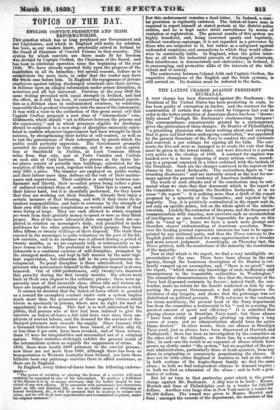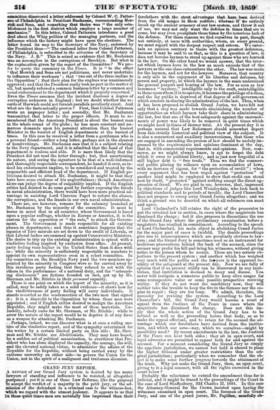THE LATEST CHARGE AGAINST PRESIDENT BUCHAN AN.
A NEW charge has been discovered against Mr. Buchanan : the President of the United States has been peculating in coals, he has been guilty of corruption in timber, and the contract for the construction of certain war ships voted by Congress last year in order to the better protection of American shores has been "shame- fully abused" through Mr. Buchanan's electioneering intrigues ! The correspondence conspicuously printed by a contemporary gives the particulars of these charges. Dr Hunter of Philadelphia, a practising physician who knew nothing about coal excepting that it gave out heat when undergoing combustion," was appointed by the present Secretary of the Navy to conduct the coal contracts and received, a per tentage for signing all the bills. The con- tracts for live oak were so managed as to evade the rule that they must be given to the lowest bidder, and were diverted to a person very active in the election of 1856. A contract for engines was handed over to a house disposing of many artizan votes, accord- ing to a proposal conveyed in a letter endorsed with the initials of the President. Such are the charges conveyed in the report on the abuses in the naval dockyards. The accusations figure as " as- tounding disclosures" and are instantly seized as the text for ser- mons against the general tendency of American institutions. The worth of such attacks and of the conclusions may be esti- mated when we state that that document which is the report of the Committee to investigate the Brooklyn dockyards, is in no sense "the report" : it is nothing more than a draft of the report proposed by a minority of the Committee, and rejected by themajority. Nay, it is positively contradicted in the report sent in, not only on specific points, but on the whole spirit of the admin- istration. Luckily the extension of the press, and the frequency of communication with America, now prevents such an accumulation of intelligence as once rendered it impossible for people on this side to "read up " • hence we have a much more prompt and therefore clearer understanding of American questions. More- over the leading journal represents interests too vast to be appro- priated by any sectional party, and thus the Times conveys to the English public data sufficient for some approximation to a broader and more correct judgment. Accordingly, on Thursday last, the Times printed, with the resolutions of the minority the resolutions of the majority. Now in that which is the report, we find a very intelligible re- presentation of the case. There have been abuses in- the coal agency, though the humorous description of Dr. Hunter is evi- dently vamped up on assumption, and. " there is no proof," says the report, " which traces any knowledge of such inefficiency and incompetency to the responsible authorities in Washington." The committee discountenances the idea that the Secretary of the Navy had dispensed contracts by favour ; indeed Swift, the con- tractor, made no return for the benefit conferred on him by su porting the present Government, a fact which disproves the existence of any bargain, and shows that the patronage was not distributed on political grounds. With reference to the contracts for steam machinery, the present head of the Navy department has from the committee a testimonial to his " zeal in securing the greatest amount of speed and efficiency." It is admitted that glaring abuses exist in Brooklyn Navy-yard; but those abuses have been slowly and gradually growing up during a long course of years, and no administration should have the entire blame thereof." In other words, there are abuses in Brooklyn Navy-yard, just as abuses have been discovered at Harwich and Portsmouth ; there has been an investigation by the committee on the other side of the Atlantic, as there has by a. commission on this; in each case the result is an exposure of abuses which have grown up. slowly under "the system," but an acquittal of the pre- sent administrators, particularly those at head-quarters, from any share in originating or consciously perpetuating the abuses. It does not lie with either England or America to rail at the other ; in both sections of the Anglo-Saxon family we find the same abuse ; in both we find independent citizens to demand inquiry ; in both we find an admission of the abuse ; and in both a gua- rantee of reform. But let us turn to that particular point which is the grand charge against Mr. Buchanan. A ship was to be built ; Messrs. Merriok and Sons of Philadelphia sent in a tender for 102,000 dollars. Another very large firm in New York sent in a tender for 98,500 dollars. The award was given to Messrs. Merrick and Sons ;' amongst the records of the department, the members of the committee discovered a letter addressed by Colonel W. C. Patter- son of Philadelphia to President Buchanan, recommending Mer- rick and Sons, and remarking that theirs was " the only esta- blishment in the first district which employs a large number of mechanics." In this letter, Colonel Patterson introduces a good deal about the Whig politics of the managing partners, and the influence which the factory might have upon the elections. The letter found its way to the Secretary of the Navy, endorsed by the President thus—" The enclosed letter from Colonel Patterson, of Philadelphia, is submitted to the attention of the Secretary of the Navy. J. B." This is seized as evidence that Mr. Buchanan was an accomplice in the corruptions of Brooklyn. But what is the explanation given by the report of the Committee ? We pre- fer to quote the summary in the Times. It is " to the effect ‘- that Merrick and Bois are not politicians, and never undertake to influence their workmen' ; that two out of the three incline to the Opposition' ; that their plan for the engines was unanimously approved; and that the President really took no part in the matter at all, but merely referred a common business letter by a common and usual endorsement to the department which it properly concerned." Even the Times assumes that the incident discloses a degree of corruption unknown in England ; but we doubt whether the re- cords of Harwich could not furnish parallels peculiarly exact. And what are the facts actually proven ? First, that Colonel Patterson wrote an improper letter ; and secondly, that Mr. Buchanan transmitted that letter to the proper officers. It must be re- membered that the American President is about the busiest man in the whole round of the globe; he has more constant'and nu- merous demands upon his personal attention than the busiest Minister in the busiest of English departments at the busiest of times. In this case he received a letter from a gentleman who is a personal friend—rather a long letter, perhaps not in the clearest of handwritings. Mr. Buchanan sees that it is a subjeet relating to the Navy department, and it is admitted that the head of that department is zealous and able. It is more than likely that the President did not read the letter through ; but, that ascertaining its nature, and seeing the signature to be that of a well-informed and thoroughly respectable correspondent, he handed it over, as in- deed his endorsement implies, to be considered and treated by the responsible and efficient head of the department. If English po- liticians desired to attack Mr. Buchanan, it might be that they have here some evidence of his neglectfulness ; though Americans alone can judge the degree of culpability implied. If the English critics had desired to do some good by further exposing the frauds in naval administration, there would have been more practical ad- vantage in assisting Lord Clarence Paget to reform the abuses, the corruptions, and the frauds in our own naval administration.
There are, are however, reasons for the calumny launched at Mr. Buchanan by the minority of the committee. It must be borne in mind that in all countries whose Government is based upon a popular suffrage, whether in Europe or America, it is the custom for the opposition or " the outs,' to attack the Govern- ment. The Government is made responsible for all existing abuses in departments ; and thus it sometimes happens that the legacies of Tory misrule are set down to the credit of Liberals, or that Liberal ladies are summed up against Conservative Ministers. The desire to trip up the existing administration is spiced with a vindictive feeling inspired by exclusion from office. At present, party feeling runs higher in the United States than it does with us ; while the minority is sufficiently respectable in numbers to appoint its own representatives even in a select committee. In the committee on the Brooklyn Navy yard the two members ap- pointed by the minority in Congress were so far carried away by this invidious party feeling that they refused to act with the others in the performance of a national duty, and the " astound- ing disclosures" are fictions founded on fact, got up by Mr. Sherman and Mr. Ritchie in their personal capacity.
There is one point on which the report of the minority, as it is called, may be safely taken as a solid evidence—it shows how far the vindictiveness of party feeling will carry individuals. It stands recorded as the condemnation of the two men that signed it ; it is a discredit to the Opposition by whom those men were appointed ; and if English critics desired to malign the American Republic, they might make the most of these materials. Un- luc ICly, nobody cares for Mr. Sherman, or Mr. Ritchie ; while to avow the nature of the report would be to deprive it of any force as a weapon for attacking Mr. Buchanan.
Perhaps, indeed, we can discover what is at once a ruling mo- tive of the vindictive report, and of the sympathy entertained for the writer by a certain limited party on this side : Mr. Sher- man and Mr. Ritchie are Abolitionists. They may have hoped, by a sudden act of political assassination to overthrow that Pre- sident who has alone displayed the capacity, the courage, the will, and the elevated national virtue, to administer the affairs of the Republic for the Republic, without being carried away by the extreme unworthy on either side—to govern the Union for the Union, not in the spirit of a malignant and traitorous disunion.



































 Previous page
Previous page